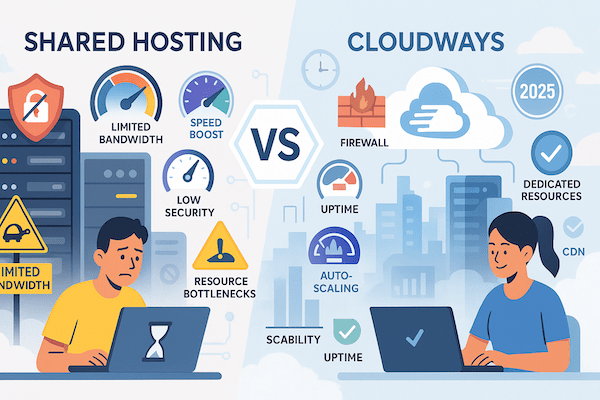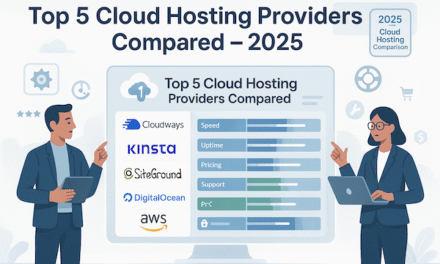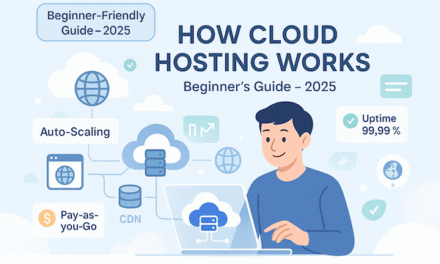The hosting decision that could make or break your website’s success.
In 2025, choosing between Cloudways and shared hosting isn’t just about cost—it’s about performance, scalability, and staying competitive in an increasingly demanding digital landscape. With 83% of users abandoning websites that take more than 3 seconds to load, your hosting choice directly impacts your bottom line.
This comprehensive comparison will help you make the right decision based on real-world performance data, security features, and scalability requirements.
🎯 Quick Summary: Cloudways vs Shared Hosting in 2025
🚀 Cloudways (Managed Cloud Hosting)
Best for: Growing businesses, e-commerce sites, high-traffic websites
Starting Price: $10/month
Key Strength: Superior performance and scalability
Performance: ⭐⭐⭐⭐⭐
Ease of Use: ⭐⭐⭐⭐
Support: ⭐⭐⭐⭐
💰 Shared Hosting
Best for: Beginners, small websites, limited budgets
Starting Price: $2-5/month
Key Strength: Affordability and simplicity
Performance: ⭐⭐⭐
Ease of Use: ⭐⭐⭐⭐⭐
Support: ⭐⭐⭐
📊 The Performance Battle: Speed Test Results
Real-World Speed Comparison
Based on extensive testing in 2025, here’s how Cloudways and shared hosting stack up in terms of pure performance:
🏁 Cloudways Vultr HF Performance
🐌 Shared Hosting Average Performance
📈 2025 Performance Statistics
Faster TTFB with Cloudways
Better Core Web Vitals
Cloudways Uptime
Faster WordPress Admin
🔍 Detailed Feature Comparison
⚡ Speed & Performance: The Critical Difference
Why Speed Matters More Than Ever in 2025
Website speed directly impacts your business success:
- SEO Rankings: Google’s Core Web Vitals are now crucial ranking factors
- User Experience: 53% of mobile users abandon sites that take longer than 3 seconds to load
- Conversion Rates: A 1-second delay can reduce conversions by 7%
- Revenue Impact: Amazon found that every 100ms of latency cost them 1% in sales
🚀 How Cloudways Achieves Superior Performance
- Dedicated Resources: No competition for CPU, RAM, or bandwidth
- Advanced Caching: Multiple caching layers including Varnish, Redis, and Memcached
- SSD Storage: NVMe SSD storage for faster data retrieval
- PHP-FPM: More efficient PHP processing than traditional shared hosting
- HTTP/2 Support: Faster content delivery with multiplexing
- Global CDN: CloudwaysCDN for worldwide content distribution
🐌 Shared Hosting Performance Limitations
- Resource Competition: Performance affected by neighboring websites
- Limited Caching: Basic caching options, if any
- Slower Storage: Often traditional HDDs instead of SSDs
- PHP Limitations: Older PHP versions and less efficient processing
- No Guaranteed Resources: Resources can be throttled during peak times
🔒 Security: Protecting Your Digital Assets
Security Landscape in 2025
Cybersecurity threats have evolved significantly, making robust hosting security more critical than ever:
- AI-powered phishing attacks increased by 150%
- Ransomware-as-a-Service (RaaS) has democratized cyber attacks
- Zero-day vulnerabilities are discovered weekly
- Supply chain attacks target hosting infrastructure
🛡️ Cloudways Security Arsenal
- Dedicated Firewalls: Server-level protection against threats
- Regular Security Patches: Automated OS and software updates
- Two-Factor Authentication: Enhanced access control
- Bot Protection: Advanced bot detection and blocking
- Auto-Healing Servers: Automatic recovery from issues
- SSL Certificates: Free Let’s Encrypt SSL with auto-renewal
- Isolated Environment: Your applications are isolated from others
- Regular Malware Scans: Proactive threat detection
- IP Whitelisting: Control access by IP addresses
⚠️ Shared Hosting Security Challenges
- Shared Vulnerabilities: One compromised site affects all sites on the server
- Limited Control: Minimal security customization options
- Resource Limitations: Security tools may be resource-intensive
- Update Dependencies: Reliant on host for security updates
- Cross-Site Contamination: Malware can spread between sites
📈 Scalability: Planning for Growth
Why Scalability Matters
In 2025’s competitive digital landscape, your hosting must grow with your business:
- Traffic Growth: Successful websites often experience exponential traffic increases
- Resource Demands: Modern web applications require more processing power
- Global Expansion: Businesses need hosting that supports international growth
- Peak Load Handling: E-commerce sites must handle traffic spikes during sales
🚀 Cloudways Scalability Advantages
- Vertical Scaling: Instantly upgrade RAM, CPU, and storage
- Horizontal Scaling: Add more servers to distribute load
- Auto-Scaling: Resources adjust automatically based on demand
- Multiple Cloud Providers: Choose from DigitalOcean, AWS, Google Cloud, Linode, Vultr
- Global Deployment: Deploy servers worldwide for better performance
- Load Balancing: Distribute traffic across multiple servers
- Database Scaling: Optimize database performance as you grow
📊 Shared Hosting Scalability Limitations
- Fixed Resources: Limited to predefined hosting packages
- Upgrade Complexity: Moving to higher tiers may require site migration
- Resource Caps: Strict limits on CPU usage, memory, and bandwidth
- No Geographic Options: Usually limited to one data center location
- Shared Infrastructure: Scaling limited by server capacity
💰 Cost Analysis: Understanding True Value
Cloudways Pricing Structure (2025)
Shared Hosting Pricing (2025)
- Budget Providers: $2-4/month (promotional pricing)
- Premium Shared: $8-15/month
- Renewal Rates: Often 2-3x the promotional price
- Hidden Costs: SSL certificates, backups, and premium support often cost extra
💡 Total Cost of Ownership (TCO) Analysis
Year 1 Costs:
- Shared Hosting: $30-180 (promotional rates)
- Cloudways: $120-156 (consistent pricing)
Year 2-3 Costs:
- Shared Hosting: $100-300+ (renewal rates + add-ons)
- Cloudways: $120-156 (same pricing)
Hidden Costs to Consider:
- Downtime Losses: Revenue lost during outages
- Performance Impact: Lost conversions due to slow loading
- SEO Penalties: Lower rankings due to poor Core Web Vitals
- Migration Costs: Moving to better hosting as you grow
🎯 Use Case Scenarios: Which Hosting Fits Your Needs?
✅ Choose Cloudways If You:
- Run a business-critical website
- Expect traffic growth or seasonal spikes
- Need superior page load speeds
- Run an e-commerce store
- Require advanced security features
- Want reliable uptime (99.9%+)
- Need staging environments
- Plan to scale globally
- Value performance over simplicity
- Can invest $13+/month for better hosting
Perfect For:
- WooCommerce/e-commerce sites
- High-traffic blogs and news sites
- SaaS applications
- Digital agencies
- Membership sites
- Corporate websites
✅ Choose Shared Hosting If You:
- Are just starting your first website
- Have a very limited budget
- Expect low to moderate traffic
- Want maximum simplicity
- Don’t need advanced features
- Prefer one-click WordPress installs
- Need included email hosting
- Want comprehensive customer support
- Don’t mind slower performance
- Plan to upgrade later as you grow
Perfect For:
- Personal blogs
- Small business websites
- Portfolio sites
- Testing/development sites
- Static informational sites
- Hobby projects
🔧 Ease of Use & Management
User Experience Comparison
🎛️ Cloudways Control Panel
Pros:
- Modern, intuitive interface
- Comprehensive server monitoring
- One-click SSL installation
- Advanced caching controls
- Git deployment integration
- Team collaboration features
- Application cloning
Cons:
- Learning curve for beginners
- No email hosting included
- Requires some technical knowledge
- Domain management is separate
- More complex initial setup
📱 Shared Hosting Control Panel (cPanel)
Pros:
- Familiar cPanel interface
- One-click app installations
- Integrated email management
- File manager included
- Database tools available
- Beginner-friendly
- Comprehensive tutorials
Cons:
- Outdated interface design
- Limited server customization
- Basic monitoring tools
- Fewer advanced features
- No staging environments
- Limited backup options
🛠️ 2025 Technology Trends Impact
Emerging Technologies Shaping Hosting
Predictive scaling & optimization
Computing for faster delivery
Next-gen protocol support
Hosting sustainability focus
🤖 How Cloudways Embraces 2025 Technologies
- AI-Powered Monitoring: Predictive analytics for performance optimization
- Auto-Healing Servers: Automated issue detection and resolution
- Edge Integration: CloudwaysCDN with global edge locations
- Container Support: Docker and Kubernetes compatibility
- Green Computing: Partners with eco-friendly cloud providers
- HTTP/3 Support: Latest protocol for faster connections
- PHP 8.2+ Support: Latest PHP versions with performance improvements
📡 Shared Hosting Technology Limitations
- Legacy Infrastructure: Often runs on older server technology
- Limited Protocol Support: May not support latest HTTP versions
- PHP Version Restrictions: Often stuck on older PHP versions
- No Edge Computing: Basic CDN options, if any
- Manual Scaling: No AI-powered optimization
❓ Frequently Asked Questions
Q: Is Cloudways worth the extra cost over shared hosting?
A: Yes, for most business websites. The performance improvements alone often pay for the price difference through better conversions and SEO rankings. If your website generates revenue, the investment pays for itself.
Q: Can I handle Cloudways if I’m not technical?
A: Yes, but there’s a learning curve. Cloudways is designed to be user-friendly while offering advanced features. Their support team and documentation help bridge the knowledge gap.
Q: How difficult is migrating from shared hosting to Cloudways?
A: Moderate difficulty. Cloudways offers one free migration, and their team can handle the technical aspects. The main challenges are learning the new interface and configuring email services.
Q: What happens if my traffic suddenly spikes?
A: Cloudways can handle traffic spikes much better than shared hosting. You can instantly scale your server resources, while shared hosting may throttle your site or experience downtime.
Q: Do I need Cloudways for a simple blog?
A: It depends on your goals. If it’s a hobby blog with minimal traffic, shared hosting is sufficient. If you plan to monetize or grow your audience, Cloudways provides a better foundation.
Q: What’s the best Cloudways server for beginners?
A: Vultr HF 1GB plan ($13/month) offers the best performance-to-price ratio and can handle most small to medium websites effectively.
🏁 Final Verdict: Making Your Decision
🏆 Choose Cloudways If:
- Website performance directly impacts your revenue
- You expect to grow beyond a simple blog
- You value reliability and uptime
- You need advanced features like staging
- You can invest $13+/month in hosting
- You want to future-proof your hosting
Bottom Line: Cloudways is the smarter long-term investment for any serious website.
💰 Choose Shared Hosting If:
- You’re building your very first website
- Budget is extremely tight (under $5/month)
- You expect minimal traffic for the foreseeable future
- You want maximum simplicity
- You’re comfortable with potentially migrating later
- Your website isn’t business-critical
Bottom Line: Shared hosting is a temporary solution—plan your upgrade path from day one.
🚀 Take Action Today
The hosting market continues to evolve, but the fundamentals remain: performance, security, and scalability matter more than ever in 2025. Switch to Cloudways.
Next Steps:
- Assess your current website’s performance
- Define your growth goals for the next 2 years
- Calculate the total cost of ownership
- Choose the hosting solution that aligns with your objectives
- Plan your migration strategy if switching hosts
Remember: Your hosting is the foundation of your online success. Choose wisely, and your website will thank you with better performance, higher rankings, and increased revenue.
🔥 Don’t settle for slow hosting. Switch to Cloudways and feel the difference—3-day free trial, no credit card needed.





